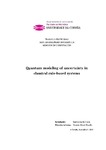Mostrar o rexistro simple do ítem
Quantum modeling of uncertainty in classical rule-based systems
| dc.contributor.advisor | Moret Bonillo, Vicente | |
| dc.contributor.author | Sande Costa, Martín | |
| dc.contributor.other | Enxeñaría informática, Grao en | es_ES |
| dc.date.accessioned | 2020-02-17T16:10:56Z | |
| dc.date.available | 2020-02-17T16:10:56Z | |
| dc.date.issued | 2019 | |
| dc.identifier.uri | http://hdl.handle.net/2183/24929 | |
| dc.description.abstract | [Resumo] A incerteza é un dos obstáculos cardinais cando se traballa con intelixencia artificial - é dicir, a información xestionada pode ser incompleta, incorrecta ou imprecisa. É particularmente un dos temas máis esenciais e relacionados cos sistemas baseados en regras. Aínda que a estatística foi historicamente o principal formalismo para representar a ambigüidade, existen métodos numéricos alternativos para cuantificalo (por exemplo, conxuntos difusos ou funcións de crenza). A incerteza asociada a unha hipótese pódese considerar consecuencia da propagación da imprecisión a través das distintas lóxicas inferenciais dun sistema. Tendo en conta isto, é posible modelar a ambigüidade? propón unha solución a este problema. O obxectivo principal deste traballo é reunir e avaliar a fondo un sistema cuántico baseado en regras que funciona de xeito análogo ao seu predecesor convencional. Este novo sistema trata a incerteza como un efecto positivo do carácter probabilístico inherente da mecánica cuántica. Trátase dun traballo de AI que usa técnicas de computación cuántica para resolver o problema de incerteza nos sistemas baseados en regras. | es_ES |
| dc.description.abstract | [Abstract] Uncertainty is one of the cardinal obstacles when working with artificial intelligence — i.e., the managed information may be incomplete, incorrect or imprecise. It is particularly one of rule-based systems’ (RBS) most essential and convoluted issues. Albeit statistics has been historically the leading formalism to represent ambiguity, there exist alternative numerical methods to quantify it (e.g., fuzzy sets or belief functions). The associated uncertainty of a hypothesis can be considered a consequence of the propagation of imprecision through the different inferential logics of a system. Considering this, is it possible to model ambiguity? A solution to this problem is proposed by. The main goal of this work is to assemble and evaluate thoroughly a QRBS that works analogously to its conventional predecessor. This new system treats uncertainty as an innate aftereffect of the inherent probabilistic nature of QM. It is a work of AI that uses QC techniques to solve the problem of uncertainty in RBSs. | es_ES |
| dc.language.iso | eng | es_ES |
| dc.rights | Atribución-NoComercial-SinDerivadas 3.0 España | es_ES |
| dc.rights.uri | http://creativecommons.org/licenses/by-nc-nd/3.0/es/ | * |
| dc.subject | Quantum computing | es_ES |
| dc.subject | Rule-based systems | es_ES |
| dc.subject | Artificial intelligence | es_ES |
| dc.subject | Uncertainty | es_ES |
| dc.subject | Quantum rule-based systems | es_ES |
| dc.subject | Computación cuántica | es_ES |
| dc.subject | Sistemas baseados en regras | es_ES |
| dc.subject | Intelixencia artificial | es_ES |
| dc.subject | Ambigüidade | es_ES |
| dc.subject | Sistemas cuánticos baseados en regras | es_ES |
| dc.title | Quantum modeling of uncertainty in classical rule-based systems | es_ES |
| dc.type | info:eu-repo/semantics/bachelorThesis | es_ES |
| dc.rights.access | info:eu-repo/semantics/openAccess | es_ES |
| dc.description.traballos | Traballo fin de grao (UDC.FIC). Enxeñaría informática. Curso 2018/2019 | es_ES |






